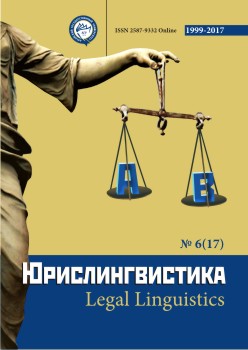PEOPLE OF OUR CZAR (TO THE METHOD OF ANALYSIS OF THE SEMANTIC AND GRAMMATICAL STRUCTURE IN LINGUISTIC EXPERTISE)
Abstract
The article is devoted to semantic analysis within the framework of linguistic expertise. There has been developed an approach of interpretative analysis of the semantic and grammatical structures. The latter refers to linguistic units that either 1) exist as a grammatical construction with definite morphological characteristics of the components linked by particular syntactic relation, 2) have certain vocabulary scope of structures: generalized semantics of the model is detailed through a particular lexical implementation, and semantic implementations can be classified.
For example, the analysis of specific lexico-grammatical construction «people of somebody» (people of Petrov), which has become the subject of legal and forensic dispute, shows the position on this particular issue and gives grounds to the employment of the approach of semantic analysis of linguistic units in linguistic research for expert purposes.
Five stages of semantic analysis of a lexico-grammatical construction have been singled out:
- · grammatical analysis of the generalized model (in this case it is a noun in the nominative case + noun in genitive),
- · analysis of a specified semantic-grammatical model, in which one syntactic position has a lexical meaning: the people of somebody,
- · analysis of the whole lexical structure of the model, taking into account the specific characteristics of the second word (whose people, where the second noun denotes an animate object),
- · interpretation of lexicalized model in the context of with its style, and the text meaning,
- · analysis of a structure with specific lexical content in the situational context and discourse.
The mentioned stages form the approach to the semantic analysis of linguistic units of the type discussed above - the semantic and grammatical constructions. To understand these structures is more than just to interpret words, you should take each stage of filling the model with lexical content, and – most importantly – not to skip the stage of possible interpretations depending on the different characteristics of each component (concrete/ abstract, proper/ common, animate / inanimate), and also the style, the general meaning of micro - and macro-context and discourse.
Downloads
Metrics
References
Арутюнова Н.Д. К проблеме функциональных типов лексического значения // Аспекты семантических исследований. – М., 1980. URL: http://mir.zavantag.com/filosofiya/883958/index.html?page=26
Гашева Л.П., Иваненко Г.С., Казачук И.Г., Мительская Ж.З., Нестерова Л.Ю., Помыкалова Т.Е., Свиридова А.В., Соловьева А.Д., Чепасова А.М., Шиганова Г.А. Cтруктурно-грамматические свойства русских фразеологизмов //
Коллективная монография. – Челябинск, 2002.
Иваненко Г.С. Три мифа в вопросах экспертной квалификации объективного и субъективного // Юрислингвистика. – 2016. – №5. – С.109-131.
Иваненко Г.С. Объективное и субъективное в конфликтном тексте: вопросы экспертной квалификации // Acta Linguistica Petropolitana. Труды института лингвистических исследований. – 2016. – Т. 12. – № 3. – С. 311-326.
Иваненко Г.С. Текстовые тактики ухода от правовой ответственности при реализации стратегии дискредитации // Вестник Костромского государственного университета им. Н.А. Некрасова. – 2013. – Т. 19. – № 4. – С. 134-137.
Кацнельсон С.Д. Речемыслительные процессы // Вопросы языкознания, 1984.
Кобозева И.М. Лингвистическая семантика. Изд. 4. – М.: УРСС, 2009.
Словарь современного русского литературного языка / М.-Л.: Академия наук СССР, 1957.
REFERENCES
Arutyunova N. D. To the Problem of Functional Types of Lexical Meaning [K probleme funkcional'nyh tipov leksicheskogo znachenija]. The Semantic Aspects of the research. Moscow, 1980. URL: http://mir.zavantag.com/filosofiya/883958/index.html?page=26
Guseva L. P., Ivanenko G. S., Kazachuk I. G., Michalska J. Z., Nesterova L. Yu., Pomykalov I.E., Sviridova A. V., Solovyov A. D., Chepasova A. M., Chiganova G. A. Structural and grammatical properties of Russian idioms [Ctrukturno-grammaticheskie svojstva russkih frazeologizmov]. Chelyabinsk, 2002.
Ivanenko G. S. Three Myths in Matters of Expertise of Objective and Subjective [Tri mifa v voprosah jekspertnoj kvalifikacii objektivnogo i subjektivnogo]. Jurilinguistics. 2016. № 5. P. 109–131.
Ivanenko G. S. Objective and Subjective Conflict in the Text: Questions of Expertise [Objektivnoe i subjektivnoe v konfliktnom tekste: voprosy jekspertnoj kvalifikacii]. Acta Linguistica Petropolitana. Proceedings of Institute for linguistic studies. 2016. Vol. 12. № 3. P. 311–326.
Ivanenko G. S. Text Tactics of Avoiding Legal Liability in the Implementation of the Strategy of Discrediting [Tekstovye taktiki uxoda ot pravovoj otvetstvennosti pri realizacii strategii iskreditacii]. Bulletin of Kostroma State University. 2013. Vol. 19. № 4. P. 134–137.
Katznelson S. D. Verbal and Cogitative Processes [Rechemyslitel'nye processy]. Problems of linguistics. 1984. № 4.
Kobozeva I. M. Linguistic Semantics [Lingvisticheskaja semantika]. Moscow, 2009.
Dictionary of Modern Russian Literary Language [Slovar' sovremennogo russkogo literaturnogo jazyka ]. V.6. Moscow–Leningrad, 1957.
Copyright (c) 2018 Юрислингвистика

This work is licensed under a Creative Commons Attribution 4.0 International License.
The authors, which are published in this journal, agree to the following conditions:
1. Authors retain the copyright to the work and transfer to the journal the right of the first publication along with the work, at the same time licensing it under the terms of the Creative Commons Attribution License, which allows others to distribute this work with the obligatory indication of the authorship of this work and a link to the original publication in this journal .
2. The authors retain the right to enter into separate, additional contractual agreements for the non-exclusive distribution of the version of the work published by this journal (for example, to place it in the university depository or to publish it in a book), with reference to the original publication in this journal.
3. Authors are allowed to post their work on the Internet (for example, in a university repository or on their personal website) before and during the review process of this journal, as this may lead to a productive discussion, as well as more links to this published work (See The Effect of Open Access).











